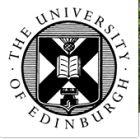My thesis, paradoxically, and a little provocatively, but nonetheless genuinely, is simply this :
PROBABILITY DOES NOT EXIST.
The abandonment of superstitious beliefs about the existence of Phlogiston, the Cosmic Ether, Absolute Space and Time, ... , or Fairies and Witches, was an essential step along the road to scientific thinking. Probability, too, if regarded as something endowed with some kind of objective existence, is no less a misleading misconception, an illusory attempt to exteriorize or materialize our true probabilistic beliefs.
Bruno de Finetti, Theory of Probability (1970), Preface
